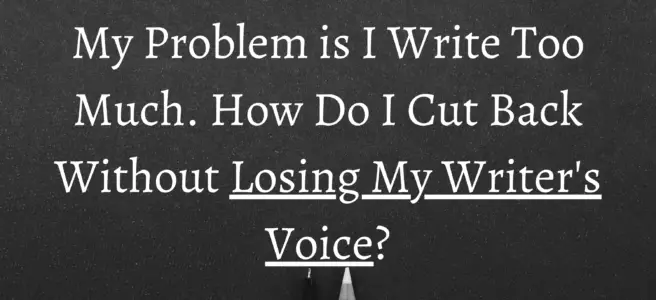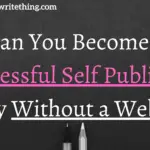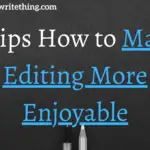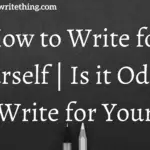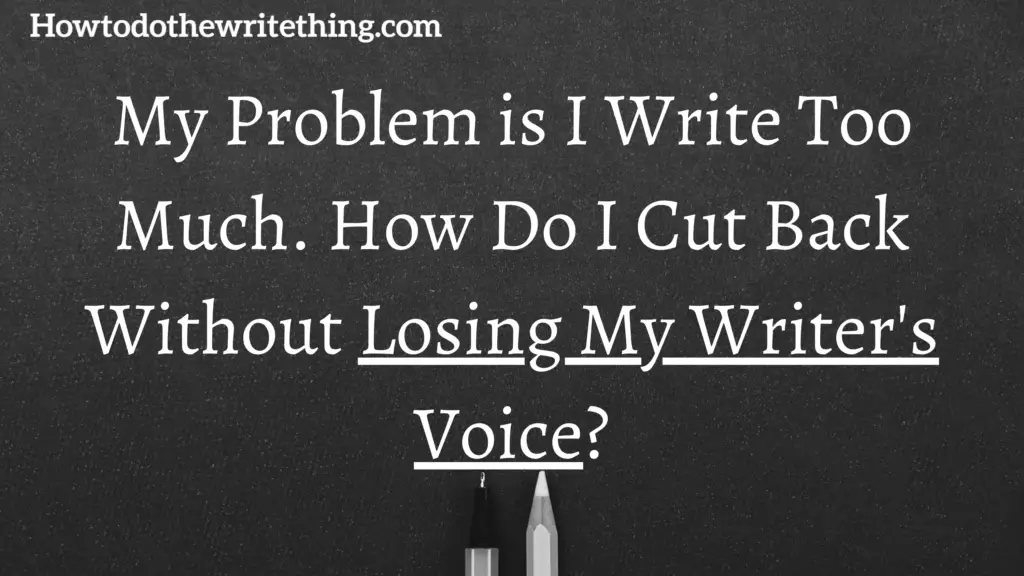
My Problem is I Write Too Much. How Do I Cut Back Without Losing My Writer’s Voice?
You have been working on your big project for a long time. When you write, you end up recording every millisecond of the story.
You know in the back of your mind, it’s too much, but you’re worried about losing key moments of the story, character dialogue, and character thoughts that are important to you.
How do we know how to cut back without falling into the childish trap of “a couple of moments later?”
End scene. Start a new scene.
Take a deep breath. It’s okay to end a scene and start a new one.
It may seem abrupt to you, but as long as it’s a logical place to end and start on the next part of the story it’ll likely work well.
We don’t have to go through every transition in the same amount of time it takes the character to go through the transition.
Going through every moment with them is tedious and often boring for our reader and sometimes it can be very tedious for us as the writer too.
Interested in starting a blog of your own? Check out Bluehost.
Use strategic sentences to get through time.
Sometimes it’s okay to summarize a large portion of time quickly.
Think of how many movies out tv shows you’ve seen that just say “5 years later” and we as the audience have mostly accepted this as a good way to transition the important parts of the story forward.
It may seem abrupt. You might not personally like it, but for the majority of audiences, this works.
Don’t underestimate practice.
You may be working on one major project, but it would be really helpful if you did at least 15 to 20 minutes of writing other short stories and exercises.
When you do that exercise, practice cutting back on explaining mundane moments that don’t really carry the story forward. Focus in on character actions, thoughts, and dialogue that moves your reader along at a better pace for the story not to lull.
Use mundane moments strategically.
You can mostly cut out things like, “she brushed her” unless it is very pivotal to the character’s personality or it will lead to a clue for a mystery that makes sense later on in the tale.
Some authors are very good at making mundane moments interesting, but they know why they are adding them.
You can change the tone of the book by adding these types of normal moments, but just be sure it fits into the narrative and that moment in the narrative.
If your story moves very quickly a good moment of normalcy can slow the pace for the reader to have a needed breather before jumping back into it. So we’re aren’t saying that a rule or principle is just to cut everything that seems mundane. Just learn when and how often it makes sense in the story.
Some mundane moments make stories better, but most just cause our reader to take a nap. 😴
Interested in starting a blog of your own? Check out Bluehost.
When drafting don’t over analyze too much.
If it’s your first draft, don’t take too much time to stop and think about if you’re writing too much.
You don’t want to stop your creativity flow. While the story is coming to you just keep going.
It’s after the first draft that you really want to take a hard look at every description and every sentence and cut out what’s unnecessary.
For the first draft just let it flow naturally until you have the entire story out.
Don’t worry about readers connecting the dots.
We don’t always need to worry about readers filling in the blanks. Readers are actually quite good at piecing together the narrative and skipping the small stuff.
Personally, as a reader, I end up skimming through parts that I find boring to get to the actual action of the story. (This could just be a me problem) I find it painfully hard to get through mundane moments in stories unless the character is so interesting that I actually want to know their morning bathroom routine 😂 (could just be my ADD though, not sure.)
So as a reader, if you don’t skip writing the boring stuff, don’t worry, I will skip reading it for you!
Think of the last time you saw or read a good story. Think about scenes like this setup,
a family is having dinner. They get into an argument and everyone leaves the table. One member goes to take a shower while the other goes to listen to music in their room.
We don’t have to follow each character up the stairs and the one into the room where they close and lock the door. Then they grab their remote. Then they jump on their bed. They place their pillow under their arm in a comfortable position. They then turn the power on. They choose song number 3. While the other character goes into the bathroom. They shut the door and lock it…
I think you see the point here. The reader will mostly fill in all those detailed blanks of you say, “Clara went into her room to listen to music and Sarah went to go take a shower. While both of them were unable to hear anything there was a knock at the door.”
Try to spend your time reading and looking in between the lines. What do successful authors skip as far as what could be considered over detailed information?
Did you notice it the first time you read it? Did it bother you then? You start to be able to see from the reader’s perspective how we usually just fill in the blanks.
Readers are counting on us to do this for them. To skip the unimportant details and get straight to the good stuff. If we tell them that Clara did or didn’t lock her door they’ll start to wonder why. If you didn’t make a reason for it, they’ll wonder why you told them. If you told them for no reason they might start to think that your writing is a waste of their time.
(Read books like “The Martian” that do a good job of being light on details but still entertaining.)
Interested in starting a blog of your own? Check out Bluehost.
Keep a “deleted scenes” document.
If you’re like me, you really don’t want to throw anything out. (Like I keep Amazon boxes for a couple of days just in case I feel like I need them for something. I try not to be a packrat, but the struggle is real.)
I have the same problem with some of my stories. I don’t really want to throw any scenes out. So instead of deleting it completely just cut and paste it to a deleted scenes page for that story.
Then you have options.
You can keep the page just for you or you can get creative with it.
You can add in “deleted scenes” at the end of the book for the fun of it or you could be even crazier.
For real fans of your books, you could make a second version and call it the “author’s cut.” Sell it alongside the normal version with the deleted scenes added back in.
Maybe some of your super fans will buy the “author’s cut” version too. 😎
That’s all for now.
My Problem is I Write Too Much, How Do I Cut Back Without Losing My Writer’s Voice?
Enjoying My Problem is I Write Too Much, How Do I Cut Back Without Losing My Writer’s Voice? Take a moment and consider sharing this social-friendly image to say thanks and feel free to comment with your thoughts below! 🙂
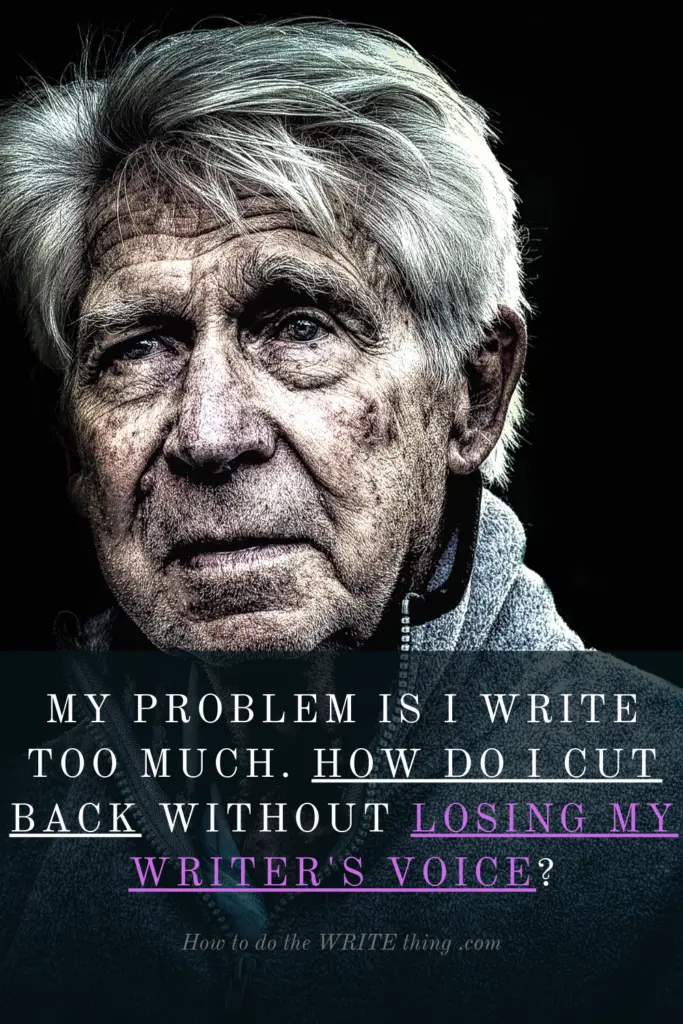
Interested in starting a blog of your own? Check out Bluehost.
Hope this helps!
Happy writing!
Resources:
How to Start a Blog in 11 Simple Easy Steps in 2020
How to Write a Book: 32 Tips | Your MASSIVE Guide How to Write a Book
This post:
My Problem is I Write Too Much, How Do I Cut Back Without Losing My Writer’s Voice?
Interested in starting a blog of your own? Check out Bluehost.
Make sure your posts are readable. Use this readability score check
Want to check out a writer’s community to test your writing and get feedback?
My Problem is I Write Too Much, How Do I Cut Back Without Losing My Writer’s Voice?
Check out these FREE trial resources from Amazon for when you work from home (or are stuck at home 🙂 ) As an Amazon associate, if you do sign up or buy anything using Amazon links from our site we make a commission at no extra cost to you.
Free Prime Membership Trial:
Try Amazon Prime 30-Day Free Trial
Try Prime Discounted (Free Trial)
My Problem is I Write Too Much, How Do I Cut Back Without Losing My Writer’s Voice?
Enjoying My Problem is I Write Too Much, How Do I Cut Back Without Losing My Writer’s Voice? Take a moment and consider sharing this social-friendly image to say thanks and feel free to comment with your thoughts below! 🙂
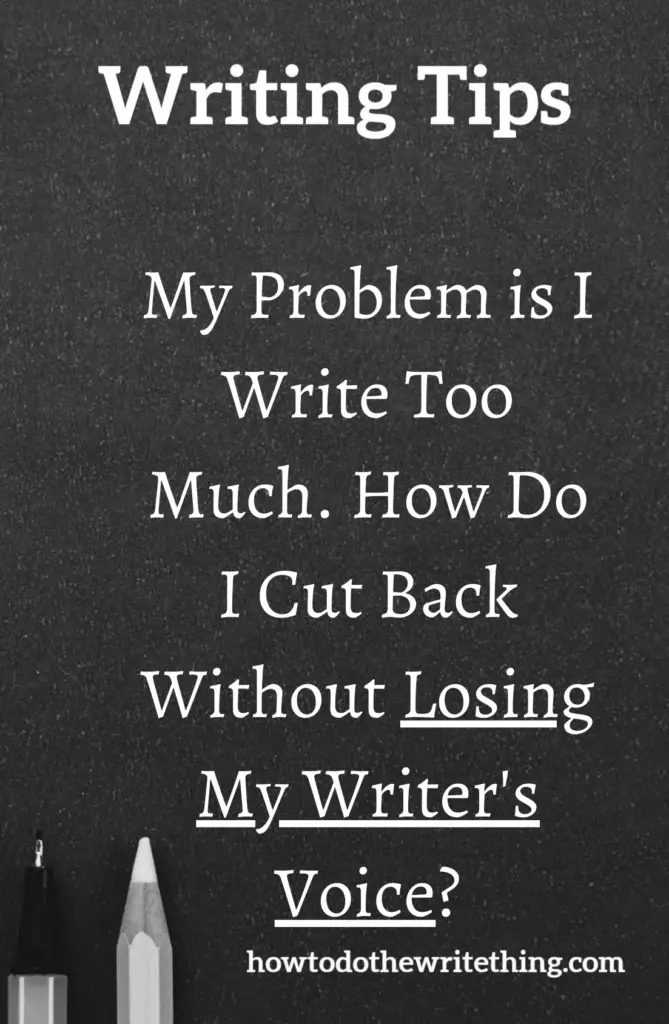
We hope you enjoyed: My Problem is I Write Too Much, How Do I Cut Back Without Losing My Writer’s Voice?
